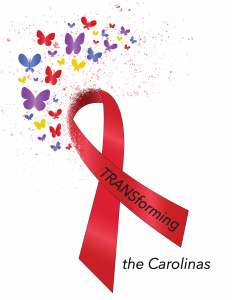TRANSforming the Carolinas
Background
HIV incidence among transgender women is estimated to be as high 2.8 new cases of HIV per 100 people each year. Nationwide, 44% of Black transgender women and 26% of transgender Latina women are living with HIV. It is estimated that 3% of transgender men are living with HIV. This is ten times higher than the national percentage and there is a disproportionate impact on among Black and Hispanic/Latino transgender men. Despite heightened vulnerability to HIV, PrEP use is low among transgender people of color. Stigma, invisibility in PrEP advertising, and concerns about drug interactions have been identified as significant barriers to PrEP uptake among transgender people. Among transgender people living with HIV, engagement in HIV care, from testing to medication adherence, is also lower than other populations. Limited access to gender affirming health care is a key barrier to engagement.
Existing studies of PrEP have been conducted predominately in large cities like New York and San Francisco, where transgender people do not face the same structural barriers (e.g. lack of protective laws and policies) or religious-based stigma faced by transgender people in the South. In order to successfully end the HIV epidemic, the specific needs of transgender people of color in the South must be identified and addressed. There are very few studies of HIV among transgender people in North Carolina (NC). Unpublished data from two transgender focus groups by the South Carolina HIV Council in 2016 found multiple barriers to care. These barriers included stigma, distrust of medicine, lack of knowledge, and experiences of racial discrimination. These data are an important start; however community-derived data specific to acceptability, feasibility, and priorities for HIV prevention and care interventions among transgender people across NC and SC are needed in order to implement effective, accessible programs the region.
Objective
This proposal focuses on transgender people in the South, a key population with a disproportionate burden of HIV in the United States in a region with the highest number of new infections in the country. The study is designed to address the federal End the Epidemic (EtHE) pillars as well as National Institutes of Health (NIH) HIV/AIDS Research Priorities to increase HIV testing (diagnose), improve engagement in HIV care (treat), and improve PrEP use (protect). The specific aims of this project are to:
- Identify relevant structural, social, and individual drivers of disparities in HIV prevention and care engagement among transgender people of color in NC and SC.
- Map community resources available to reduce barriers to HIV prevention and care engagement among transgender people of color in NC and SC.
- Engage key community members to prioritize feasible and acceptable HIV prevention and care strategies to be implemented in NC and SC.
Our multidisciplinary team of researchers, clinicians, policy experts, and community leaders are well-positioned to address these aims using an approach that will include: 1) a review of state and local laws and policies that impact HIV risk and engagement in care for transgender people of color; 2) interviews with community leaders and stakeholders; 3) structured interviews with transgender people of color; and 4) focus group discussions to map community resources and prioritize interventions. At the end of the grant period, we will have and understanding of relevant policies in the area, a prioritized list of community-derived interventions, and a strategy for implementation.
Outcomes
The goal of the study is to identify, prioritize, and strategize a plan to collaborate across states to address the unique needs of transgender people of color who are at risk for HIV and living with HIV in NC and SC. This project will generate a policy analysis that identifies barriers and facilitators at the state and local level to HIV prevention and care for transgender people in North and South Carolina, and a list of community-derived priorities to inform each state’s plan to address HIV.
On December 6, we held a virtual panel discussion with community members to discuss preliminary findings from the study. View the webinar recording.
Study Team/Roles
- Tonia Poteat, PhD, PA-C, MPH: Principal Investigator/Project Lead
- Kamla Sanasi, MD: Co-Investigator
- Sharon Weissman, MD: Co-Investigator
- Nastacia Pereira, MPH: Project Coordinator
 Partner Organizations
Partner Organizations
- South Carolina HIV Planning Council, Columbia, SC
- University of South Carolina, Columbia, SC
- South Carolina Department of Health and Environmental Control, Columbia, SC
- Mecklenburg County Health Department, NC
- Medical University of South Carolina, Charleston, SC
- Roper St. Francis Healthcare, SC
- Equality North Carolina, Raleigh, NC
- University of Arkansas College of Public Health, Little Rock, AR
- University of Georgia College of Education, Athens, GA
- TRANSnetwork: Trans Health Research and Advocacy Network in the South
 Funding Source
Funding Source
- August 2019 – July 2020
 Publications/Presentations
Publications/Presentations
- Poteat, T. “TRANSforming the Carolinas: Preparing to End the Epidemic for Transgender People of Color in the Carolinas;” 2019 World AIDS Day Symposium; Chapel Hill, NC: December 6, 2019.
